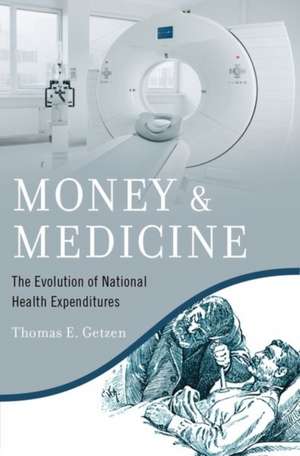Money and Medicine: The Evolution of National Health Expenditures
Autor Thomas E. Getzenen Limba Engleză Hardback – 21 dec 2022
Preț: 227.42 lei
Nou
Puncte Express: 341
Preț estimativ în valută:
43.52€ • 46.53$ • 36.28£
43.52€ • 46.53$ • 36.28£
Carte disponibilă
Livrare economică 17-24 martie
Preluare comenzi: 021 569.72.76
Specificații
ISBN-13: 9780197573266
ISBN-10: 0197573266
Pagini: 360
Ilustrații: 46 b/w line drawings; 43 tables
Dimensiuni: 242 x 162 x 29 mm
Greutate: 0.64 kg
Editura: Oxford University Press
Colecția OUP USA
Locul publicării:New York, United States
ISBN-10: 0197573266
Pagini: 360
Ilustrații: 46 b/w line drawings; 43 tables
Dimensiuni: 242 x 162 x 29 mm
Greutate: 0.64 kg
Editura: Oxford University Press
Colecția OUP USA
Locul publicării:New York, United States
Recenzii
Money and Medicine weaves a clear, unified narrative about the rise of national health care systems and medical spending over time that will be of great interest to readers in health care and economics alike.
Political debates about health care almost always come down to money. There is no one better than Tom Getzen to explain how nations count up what they spend on health care, to peer into the future to understand where spending is heading, and to dissect why the United States is such an outlier when it comes to health expenditures.
The founder of the International Health Economics Association takes a characteristically bold and ambitious view of the evolution of healthcare spending. His book reflects a lifetime of research and scholarship, having a historical and geographic sweep that brings fascinating details together with rigorous statistical evidence to highlight the macroeconomic and historical dimensions of the economics of health care.
Professor Getzen offers a surprisingly personal and engaging survey of the history of health care expenditures. Taking a panoramic tour across time and space illuminates the co-transformations of the health care sector and the modern nation state. He brings to the table every relevant scrap of evidence, and then-refreshingly, with humility—highlights the limits to what we can know, and we can say, about the future as it unfolds.
Global growth in health spending by people and their governments means more of our money will be headed into the world's inscrutable health systems. Getzen's mastery of the subject across time and space is a gift to everyone who wants health dollars to achieve value, fairness, and health for all.
This book has been a major project for a number of years. I cannot think of any source documenting the key influences on health expenditure in more detail, with such a large number of citations. Much of the research for the book was conducted during the period during which Tom was establishing the International Health Economics Association (IHEA). That enduring professional society and this book will be his legacy.
This text intriguingly poses the enigma of why health expenditure has grown exponentially in the developed world, most acutely in the US, over the last 150 years, offering a riddle that may keep the curious reader obsessively engaged, unable to put down the book.
Political debates about health care almost always come down to money. There is no one better than Tom Getzen to explain how nations count up what they spend on health care, to peer into the future to understand where spending is heading, and to dissect why the United States is such an outlier when it comes to health expenditures.
The founder of the International Health Economics Association takes a characteristically bold and ambitious view of the evolution of healthcare spending. His book reflects a lifetime of research and scholarship, having a historical and geographic sweep that brings fascinating details together with rigorous statistical evidence to highlight the macroeconomic and historical dimensions of the economics of health care.
Professor Getzen offers a surprisingly personal and engaging survey of the history of health care expenditures. Taking a panoramic tour across time and space illuminates the co-transformations of the health care sector and the modern nation state. He brings to the table every relevant scrap of evidence, and then-refreshingly, with humility—highlights the limits to what we can know, and we can say, about the future as it unfolds.
Global growth in health spending by people and their governments means more of our money will be headed into the world's inscrutable health systems. Getzen's mastery of the subject across time and space is a gift to everyone who wants health dollars to achieve value, fairness, and health for all.
This book has been a major project for a number of years. I cannot think of any source documenting the key influences on health expenditure in more detail, with such a large number of citations. Much of the research for the book was conducted during the period during which Tom was establishing the International Health Economics Association (IHEA). That enduring professional society and this book will be his legacy.
This text intriguingly poses the enigma of why health expenditure has grown exponentially in the developed world, most acutely in the US, over the last 150 years, offering a riddle that may keep the curious reader obsessively engaged, unable to put down the book.
Notă biografică
Thomas E. Getzen is Professor Emeritus of Risk, Insurance, and Health Management at Temple University. Founder of iHEA-International Health Economics Association and its executive director for 22 years, he was instrumental in the formation of AfHEA-African Health Economics Association, ASHEcon-American Health Economics Association, and EUHEA - European Health Economics Association. His textbook Health Economics & Financing is now in its 6th edition and used at universities around the world. Formerly Editor-in-Chief for HEN-Health Economics Network at SSRN, associate editor for Health Economics, and a member of the Institute of Medicine committee for the future of public health, Professor Getzen currently produces the Model of Long Run Medical Cost Trends each year for the Society of Actuaries.
